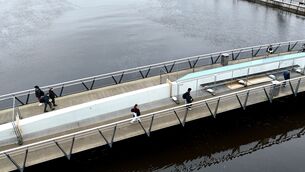Calls for expedited solution to address backlog for residence permit renewals in Cork city

Ms Joseph, who spoke to The Echo,said that migrants are waiting up to six months for a renewal appointment at the Cork Immigration Office at Anglesea Street Garda Station.
THE Cork Organisation for Indian Nurses (COINNS) is calling for an expedited solution to the backlog in renewing Irish Residence Permits (IRP), as more than 500 families are being negatively impacted across the county, says organisation president, Janet Baby Joseph.
Ms Joseph, who spoke to The Echo about the frustrating process, said that migrants are waiting up to six months for a renewal appointment at the Cork Immigration Office at Anglesea Street Garda Station.
“There is a lag of four to six months, and without a valid IRP, we cannot work,” Ms Joseph said. “There are 500 plus nurses and their families being affected. The issue is within the Cork city limits.
“If you go for a mortgage, a loan, or any kind of documentation, you won’t get it without a valid card,” she added. “You can’t travel out of Ireland without one either.”
In relation to the impact that an invalid IRP would have on someone’s day-to-day working abilities, Ms Joseph said that many employers are sympathetic to their situation, however, working without a valid card is against the law.
“Many employers do understand,” she said. “We show them the e-mails we send, they see we have to fight, but the thing is, it’s illegal.”
Solutions
Speaking on solutions that could be put in place to remedy such a backlog, Ms Joseph suggested following in the footsteps of other cities, or expanding the catchment area to allow migrants in the city to book appointments at any immigration office across the county.
“There are three solutions that we think can be done. Firstly, there’s very limited staff doing this work in the Anglesea Street station, so they need to increase those numbers,” she said. “Secondly, in Dublin, there is an online system which is working perfectly. They could do something similar here.
“Thirdly, what we could do is a centralised system. If we were allowed to go anywhere in Cork, that would be much better, because it’s easy to get an appointment in a county station,” she said.
“In Bandon, Bantry, Mallow and Macroom, it’s easy to get an appointment. The problem is all with the Anglesea Street Garda station.”
“This issue is our main priority,” she added. “We need more people talking about it.”
Issue raised in Dáil
People Before Profit-Solidarity Cork North-Central TD, Mick Barry raised the issue in the Dáil with Taoiseach, Simon Harris recently in what he described as a positive interaction.
In his address, Mr Barry said: “This is causing havoc for people from outside of the European Economic Area (EEA). Problems with employers, problems with landlords, problems opening bank accounts, and for some, it makes it impossible to travel home for family emergencies, such as the death of a parent or a serious illness with a child.
“There were nearly 9,000 non-EEA nationals living in Cork city in 2022, and many of them play vital roles in the life of the city.”
Speaking to The Echo, Mr Barry said: “I await the Taoiseach’s letter with great interest. The exchange was positive, but the people who are being messed about here will judge the Government not on their words but on their deeds. Action is needed, and quickly,” he added.
Transfer of functions
A spokesperson for An Garda Síochána said that the Commission on the Future of Policing in Ireland (COFPI) recommended that immigration administrative functions should transfer from the Garda National Immigration Bureau (GNIB) to the Immigration Service Delivery (ISD) function of the Department of Justice, and that a number of these functions have already been transferred.
“A roadmap outlining the functions for transfer is being finalised,” the spokesperson said. “This will set out the timeline for the transfer of work relating to the nationwide first registrations and renewals of residence permissions for all other counties from An Garda Síochána to the Registration Office, which is expected to be substantially completed within the next 12 months.
“An Garda Síochána has seen year on year increase in demand for immigration-related appointments in Cork Garda Division.
“Local Garda management monitor the caseload on an ongoing basis [and] applications are triaged to identify urgent cases which are prioritised. People are required to register with their local Garda National Immigration Bureau in the Registration District in which they reside.”







 App?
App?


